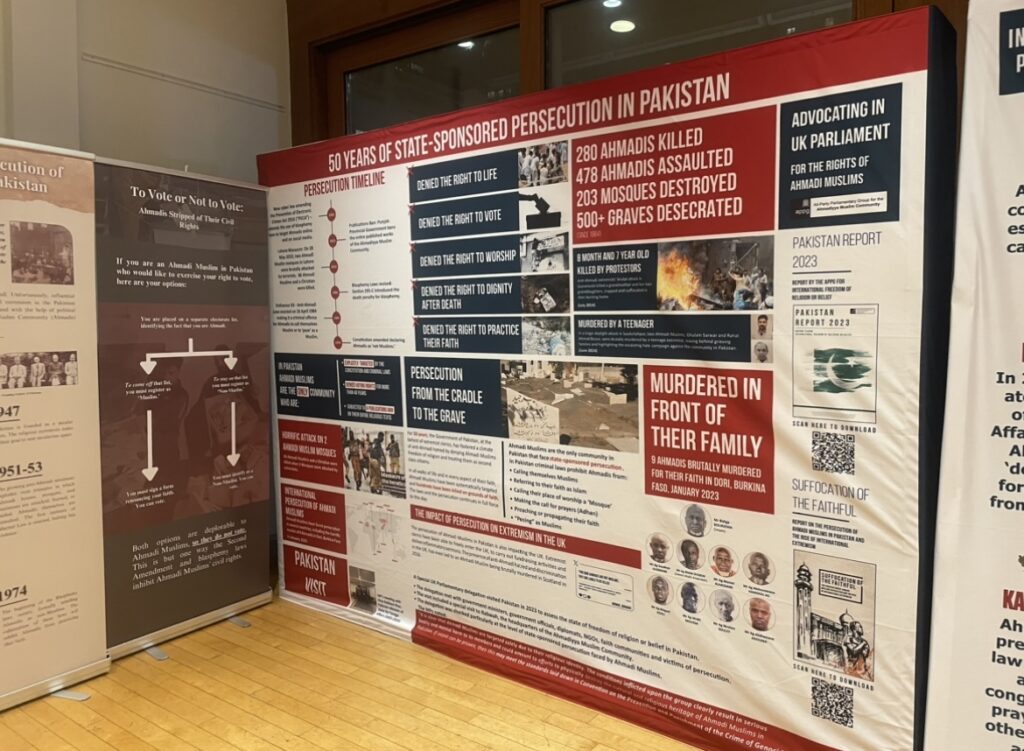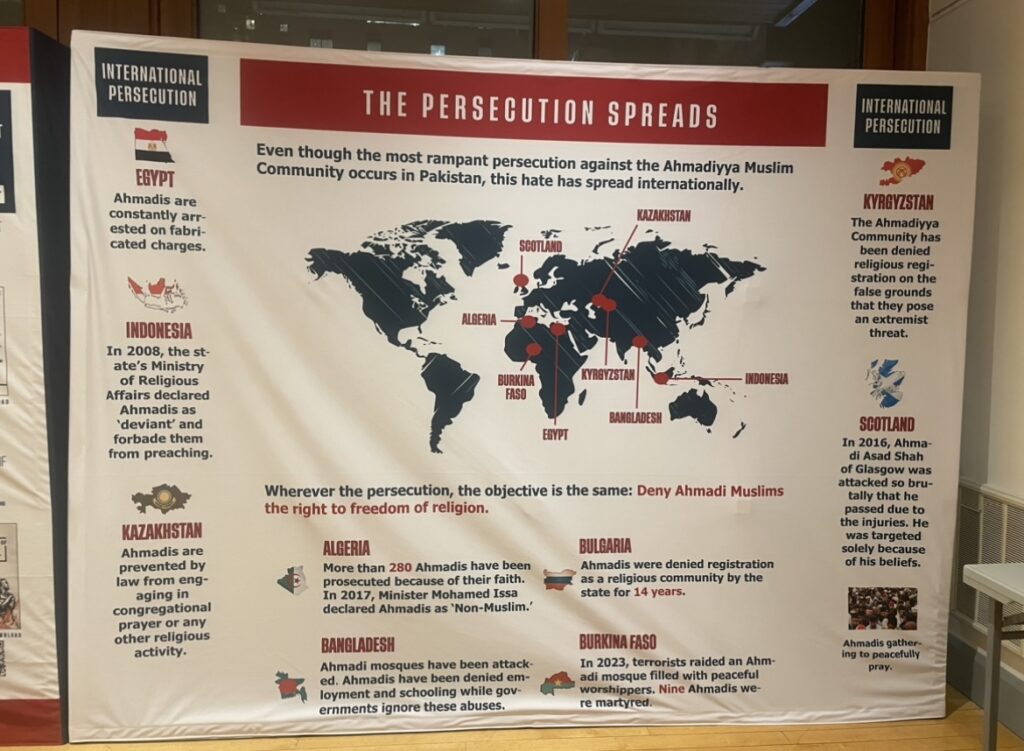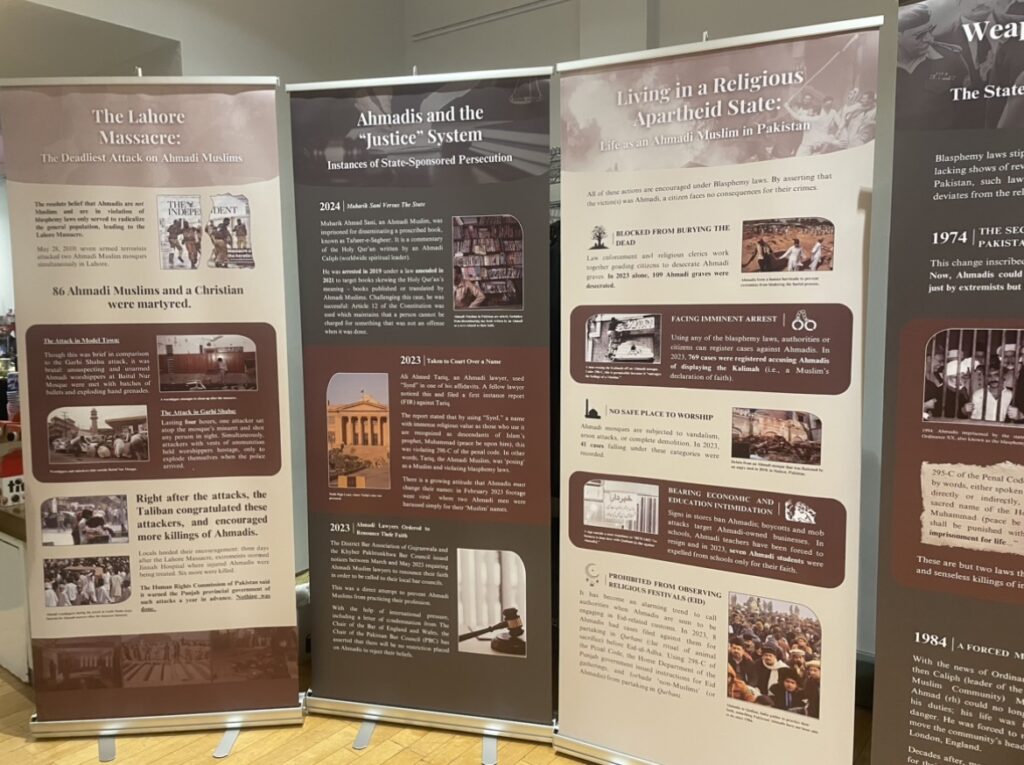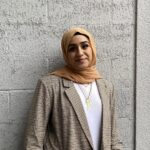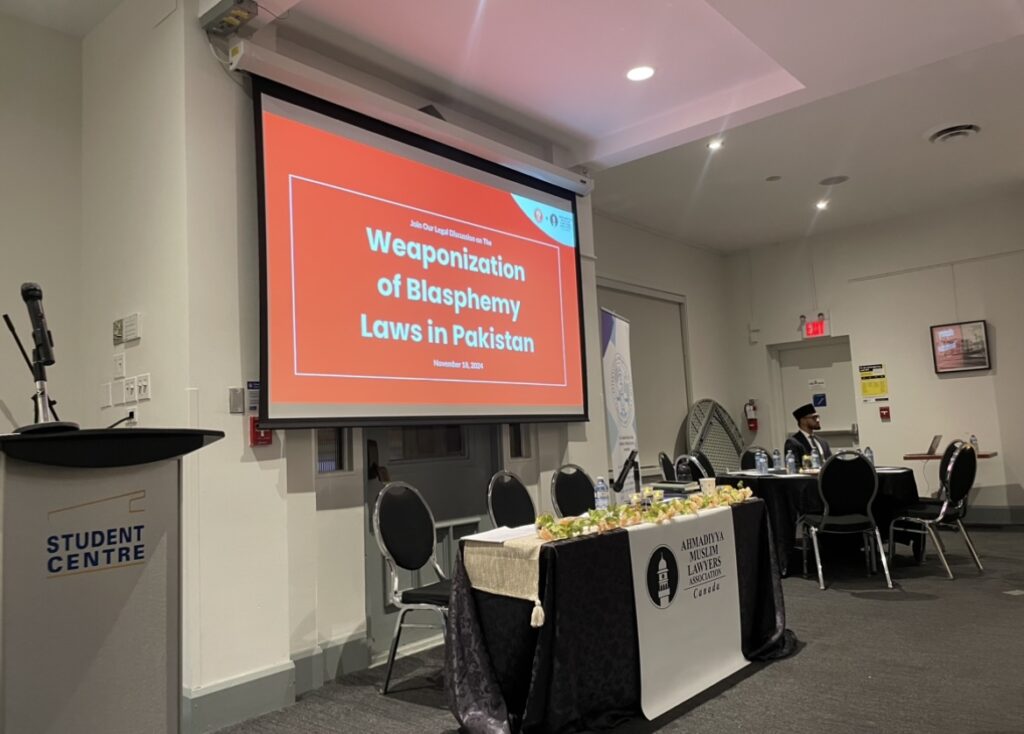
Listen to the whole story
Legal experts and human rights advocates gathered at Toronto Metropolitan University (TMU) on Monday to discuss the weaponisation of Pakistan’s blasphemy laws, describing the systemic persecution of Ahmadi Muslims as “religious apartheid” and a form of “cultural genocide.”
Hosted by the Ahmadiyya Muslim Lawyers Association of Canada (AMLAC) in partnership with TMU’s Ahmadi Women’s Student Association (AMSA), the seminar brought attention to the legal, social, and emotional toll these laws impose, particularly on the Ahmadi community.
Actual numbers for Ahmadi Muslims in Canada are sparse, and Statistics Canada doesn’t break down all religions by subsects, but a 2014 academic book estimated around 25,000.
Ahmadi Muslims, a minority founded in 1889, face severe persecution in Pakistan due to their beliefs. Declared non-Muslims in 1974 and banned from practicing their faith, they face imprisonment or death for violations. This systemic discrimination includes mob violence, grave desecration, and restrictions on worship.
Pakistan’s blasphemy laws, particularly sections 295-A, 295-B, and 295-C of the penal code, have been criticised for criminalising fundamental religious practices.
“The blasphemy law has left the courtrooms. Cases are no longer decided on legal merit. It’s mob pressure that dictates outcomes, and once an FIR is cut, it’s a one-way street of injustice,” said founder of Pakistan for All Shaan Taseer, a panellist at the event.
Taseer described the systemic oppression of Ahmadis as a form of “religious apartheid.”
“Forcing a title or identity on someone is an act of violence. It dehumanizes them and opens the door for brutality. It’s the ultimate dehumanization of a people,” he said.
Taseer’s description of the situation as “religious apartheid” is supported by the systematic exclusion of Ahmadis from public life. They cannot vote in general elections unless they declare themselves non-Muslims, disenfranchising the community.
Maood Bin Tahir, AMLAC President and lawyer, highlighted historical cases that illustrate the misuse of these laws, including the Abdul Rahman Bucha case, which upheld Ahmadis’ rights to practice their faith before Ordinance XX stripped those freedoms away.
Ordinance XX was introduced in 1984 under the military regime of General and former President of Pakistan, Zia-ul-Haq, and specifically targeted Ahmadis by criminalising their religious practices. Ahmadis are prohibited from referring to themselves as Muslims, calling their places of worship mosques, or even reciting Islamic prayers.
In many cases, mere accusations are enough to provoke deadly riots or targeted attacks. According to Tahir, even basic acts like saying “peace be upon you” (Assalamu Alaikum) can lead to arrest or violence for Ahmadis in Pakistan.
“It is a heavy toll on your heart not to be able to greet someone with the best greeting, Assalamu Alaikum, or to call for prayers,” Tahir said. He also described the escalation of blasphemy laws, which now impose punishments ranging from imprisonment to the death penalty.
“The laws evolved from jail time to life imprisonment to the death penalty, and even a fine that punishes the victim’s family,” Tahir said.
“The Holy Quran Printing and Recording Act has come into play,” Tahir explained, detailing how authorities misuse the law under cybercrime regulations. “I will send you a WhatsApp message. Once they find the Quran in there, they will convict you,” he said, describing how possessing Quranic content can lead to arrests.
The panel discussed how Ahmadis in Pakistan face more than legal restrictions. They are socially ostracised and often economically marginalized. Many are boycotted by businesses, denied employment, or forced to flee their homes.
Daniyah Yaqoob, president of AMSA explained the emotional pain of seeing her community persecuted, describing how heartbreaking it is to see reports of graves desecrated and people jailed or fined.
“It’s heart-wrenching that a country we’ve given so much to won’t associate with us and, in certain cases, would rather kill us,” she said.
Reflecting on her life in Canada, Yaqoob admitted feeling guilty for being safe while others like her face danger across the world. “That’s why we do events like this, to bring their voices to a stage like this in a country like this and ensure that whatever can be done for them back home is being done,” she said.
“At the end of the day, it’s about building knowledge, love, and understanding. We hope that one day these can triumph over fear.”
The seminar served as both a reflection and a call for justice. The event concluded with a silent prayer led by Lal Khan Malik, president of the Ahmadiyya Muslim Jamaat Canada, symbolising hope and resilience in the face of adversity.
The United Nations, Amnesty International, and other human rights organisations have condemned Pakistan’s blasphemy laws. Many countries, including Canada, have granted asylum to Ahmadis fleeing persecution.
Reporter, On The Record, Fall 2024.
This article may have been created with the use of AI tools such as Google Docs, Grammarly, and/or Otter.ai for transcription.

